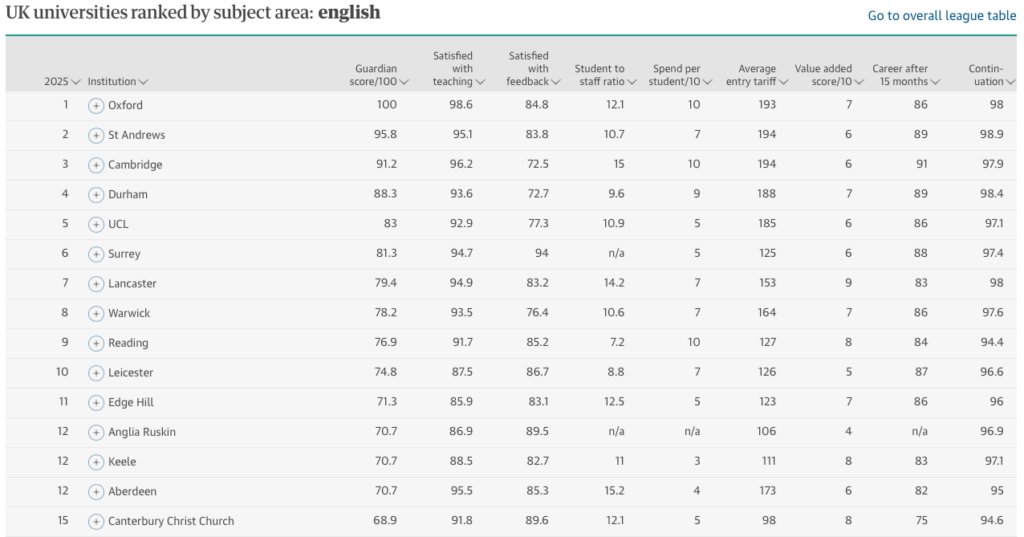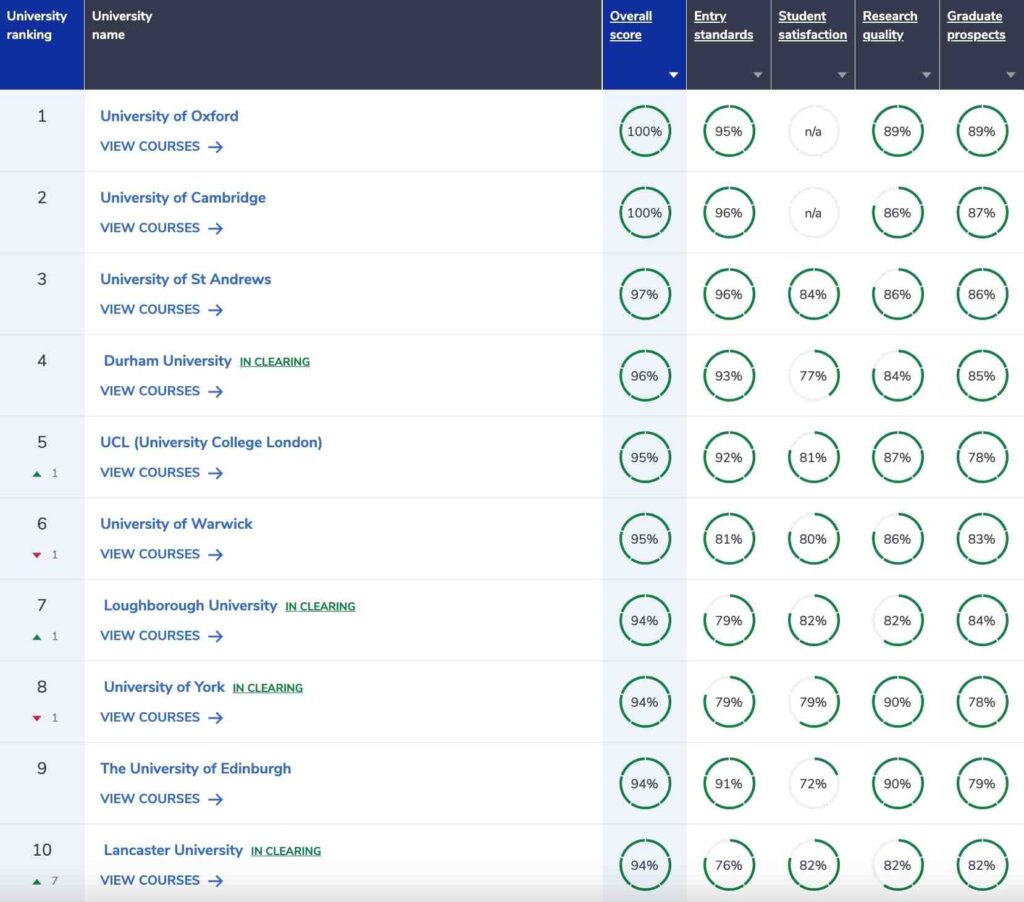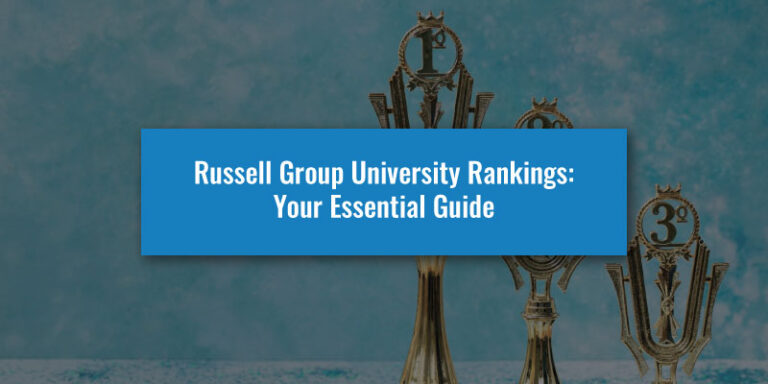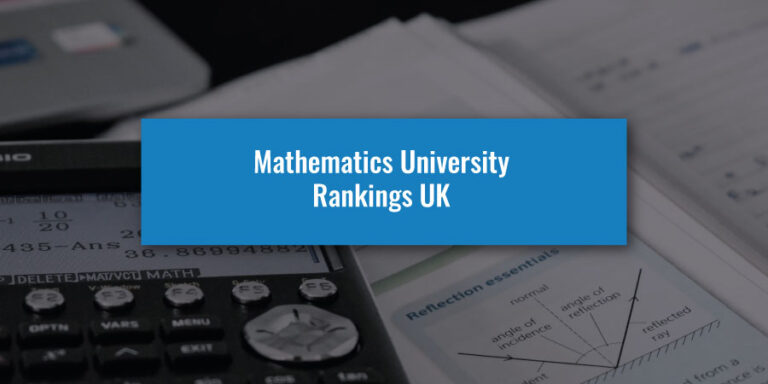Finding the right university can be difficult, especially when you’re applying for a subject that’s taught at 80+ universities in the UK. If you don’t know where to start, university rankings may be a good option.
Ranking tables are made for every major subject taught in the UK and use a wide selection of data and facts to determine which universities are the best for specific courses. However, while these tables can be useful, they aren’t perfect and shouldn’t be the only resource you use when selecting university choices.
In this guide, we’ll take a look at the two most popular ranking tables in the UK to see how each one ranks English degrees. Plus, we’ll see how rankings can be used to effectively select your preferred university through a mixture of data and subjective opinion. Let’s get started.
Who Makes The English rankings?
The first thing we need to learn is who actually makes these university ranking tables. There are various different organisations both in the UK and internationally that rank universities on a national and global level. For this guide, we’ll be focusing on two of the biggest ranking tables in the UK – Complete University Guide and The Guardian.
While both of these tables gather data in similar ways and from similar sources, the placements of universities on each table can vary greatly, showing that the two organisations interpret the data differently and include unique factors.
This may be a bit confusing, as both organisations use objective data in their ranking process, but we’ll explore why these two tables differ later on in this guide. Firstly, let’s look at each organisation and take a look at the top 25 entries of each table.
Want to get your offer to study English at Oxbridge?
Want to study English at Oxford or Cambridge? Writing the perfect Personal Statement, scoring highly on your admissions test and interviewing like a pro is how you get your dream Oxbridge English offer.
Discover our Full-Blue English Programme for comprehensive admissions support by clicking the button below to enrol and triple your chances of success.
The Guardian English Rankings
To create their English degree rankings, The Guardian uses the following headings:
Guardian score/100 – rating of excellence based on a combination of the other factors.
Satisfied with the course – the rating of the overall quality of the course, given by final-year students in the latest National Students Survey (NSS) given as a percentage.
Satisfied with the teaching – the rating of the quality of teaching on the course given by final-year students in the latest NSS.
Satisfied with feedback – the rating of the feedback and assessment, given by final-year students in the latest NSS.
Student to staff ratio – number of students per member of teaching staff.
Spend-per student/10 – money spent on each student, excluding academic staff costs, given as a rating out of ten.
Average entry tariff – typical UCAS scores of young entrants to the department.
Value-added score/10 – this score compares students’ degree results with their entry qualifications, to show how effectively they are taught – given as a score out of ten.
Career after 15 months – percentage of graduates who find graduate-level jobs, or are in further study at professional or higher education level, within 15 months of graduation.
Continuation – percentage of first-year students continuing to second-year.
The Guardian uses a variety of sources to base their scores on, including data gathered from the National Student Survey (NSS)(including student satisfaction rates) and the information provided by universities themselves. While a mixture of subjective and objective factors is used, everything is interpreted in an unbiased manner so that the rankings can accurately reflect the data they collected.
The Guardian English University Rankings 2025
Below are the top 25 entries of The Guardian’s league table for English, with both the results for 2025 and a comparison to 2024’s results:
| Postition | University | Previous Position (2024) |
|---|---|---|
| 1 | University of Oxford | 2 (>1) |
| 2 | University of St. Andrews | 1 (<1) |
| 3 | University of Cambridge | 4 (>1) |
| 4 | Durham University | 3 (<1) |
| 5 | University College London (UCL) | 6 (>1) |
| 6 | University of Surrey | 12 (>6) |
| 7 | Lancaster University | 7 (=) |
| 8 | University of Warwick | 5 (<3) |
| 9 | University of Reading | 22 (>13) |
| 10 | University of Leicester | 10 (=) |
| 11 | Edge Hill University | 8 (<3) |
| 12 (=) | Anglia Ruskin University | 11 (<1) |
| 12 (=) | University of Aberdeen | 16 (<4) |
| 12 (=) | Keele University | 45 (>33) |
| 15 | Canterbury Christ Church University | 9 (<6) |
| 16 | University of Liverpool | 26 (>10) |
| 17 | University of Glasgow | 14 (<3) |
| 18 | University of Birmingham | 28 (>10) |
| 19 | University of Sheffield | 23 (>4) |
| 20 | University of Leeds | 24 (>4) |
| 21 | University of Exeter | 17 (<4) |
| 22 | University of Southampton | 41 (>19) |
| 23 | Swansea University | 25 (>2) |
| 24 | University of Nottingham | 27 (>3) |
| 25 | University of Roehampton | 32 (>7) |
Firstly, looking at the top ten we can see that there are some very common high-ranking universities, including Oxford, Cambridge and UCL (three of the five G5 universities), as well as two other Russell Group universities – Durham and Warwick. Oxford takes the top spot, with St. Andrew’s in 2nd, which isn’t uncommon for The Guardian rankings, though it’s the only Scottish university in the top ten.
However, entries 6 to 10 include some less frequently seen this high in university rankings, including Surrey, Lancaster, Reading and Leicester. Within the rest of the list, we can see a few universities that had major jumps in the rankings, including Keele University (45th – 12th) and the University of Southampton (41st – 22nd).
The same is also true of universities that fell in the rankings, including Strathclyde (13th – 28th), Manchester (20th – 32nd) and King’s College London (19th – 42nd). Teesside, which ranked 18th in 2024, was not included in this year’s list.
The Complete University Guide English Rankings
Next, we have The Complete University Guide. As mentioned before, there aren’t too many differences between how each organisation creates their rankings, but small changes in the process can have a major impact on the results in the final table. The Complete University Guide bases its rankings on the following factors:
Overall score – the total score calculated by The Complete University Guide’s independent and trusted methodology.
Entry standards – the average UCAS tariff of new students entering university.
Student satisfaction – a guide to how satisfied students are with the quality of teaching they receive.
Research quality – a measure of the quality of the research undertaken by the university.
Research intensity – a measure of the proportion of staff involved in high-quality research at the university.
Graduate prospects – outcomes – a guide to the success of graduates after leaving university.
Graduate prospects – on track – a measure of whether recent graduates agree that their current activity fits with their future plans.
Complete University Guide condenses various factors into larger categories, which is why there are fewer scores given than The Guardian’s list. However, data is collected from similar sources – NSS and universities – so the differences come down to data interpretation.
Complete University Guide English University Ranking Table 2025
Below are the top 25 entries Complete University Guide ranking table, displaying the results for 2025 and a comparison to 2024’s results:
| Postition | University | Previous Position (2024) |
|---|---|---|
| 1 | University of Oxford | 1st (=) |
| 2 | University of Cambridge | 2nd (=) |
| 3 | University of St. Andrews | 3rd (=) |
| 4 | Durham University | 4th (=) |
| 5 | University College London (UCL) | 6th (>1) |
| 6 | University of Warwick | 5th (<1) |
| 7 | Loughborough University | 8th (>1) |
| 8 | University of York | 7th (<1) |
| 9 | University of Edinburgh | 9th (=) |
| 10 | Lancaster University | 17th (>7) |
| 11 | University of Exeter | 12th (>1) |
| 12 | University of Birmingham | 11th (<1) |
| 13 | University of Leeds | 13th (=) |
| 14 | University of Manchester | 16th (>2) |
| 15 | University of Bristol | 15th (=) |
| 16 | Newcastle University | 14th (<2) |
| 17 | University of Nottingham | 18th (>1) |
| 18 | King College London | 19th (>1) |
| 19 | University of Strathclyde | 10th (<9) |
| 20 | Royal Holloway, University of London | 23rd (>3) |
| 21 | Cardiff University | 24th (>3) |
| 22 | University of Southampton | 20th (<2) |
| 23 | University of Glasgow | 21st (<2) |
| 24 | University of Surrey | 25th (>1) |
| 25 | University of Liverpool | 32nd (>7) |
Compared to The Guardian’s list, The Complete University Guide’s ranking table appears much more stable from year to year.
Looking at the top five, we can see that the entries (though not the order) are almost identical, swapping Warwick for UCL (which each appears 6th in the other list). Beyond that, the entires start to look somewhat different, with Loughborough, York and Edinburgh all appearing in the top 10.
Other unique entries in the top 25 of this table include Royal Holloway, Newcastle, Bristol and Southampton, all of which rank lower on The Guardian’s list.
In terms of position movement, there are only a handful of notable examples. The biggest jump in placements is shared between Lancaster and Liverpool, which each rose seven spots. The biggest drop was seen by the University of Strathclyde, which fell nine spots from 10th to 19th.
Access "The Oxbridge Application Vault"
- 300+ page ebook for Oxbridge Applicants
- 25 page ebook for Personal Statement
- 2h+ online course to succeed in any exam
- Online Oxbridge Success Calculator
- 12 page ebook about UniAdmissions

Access "The Big Book Of Oxbridge Applications" For FREE
Considering studying English at Cambridge or Oxford? Download The Big Book Of Oxbridge Applications for free here to discover everything you need to know about Oxbridge English and its application process. Through over 350 pages, you’ll find:
- Over 40 admissions test practice questions
- 28 example Oxbridge Personal Statements
- Interviews with Oxbridge students and graduates
- Additional downloadable resources
Fill in your details below to claim your digital copy today!
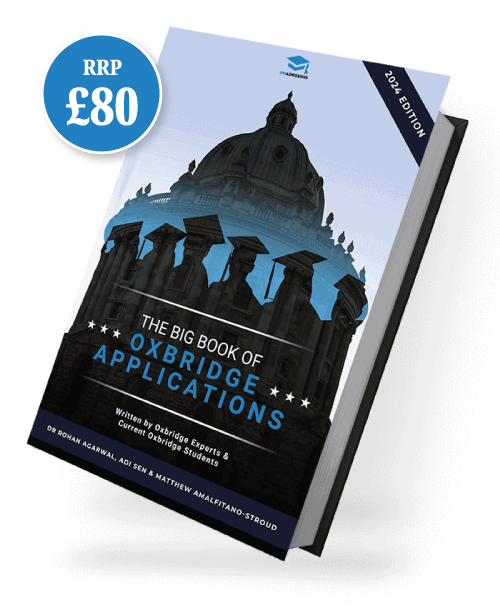
The Best and Worst UK Universities For English
Now that we understand the rankings, it’s time to look at the most interesting part; what are the best and worst English degrees according to each list? Keep in mind that neither of these lists can provide a definitive ranking as personal opinion will always play a part in university selection.
However, it’s still worth looking at the results of these tables as they can provide a general view of a university’s quality based on student surveys and data. Let’s take a look at the top and bottom five from each list.
Best UK Universities For English
As we already noted, both tables have very similar top fives in terms of entries. However, let’s explore why these universities are at the top of these lists.
Complete University Guide
- University of Oxford
- University of Cambridge
- University of St. Andrews
- Durham University
- University College London
The Guardian
- University of Oxford
- University of St. Andrews
- University of Cambridge
- Durham University
- University College London (UCL)
As is usually the case, Oxford and Cambridge each appear in the top five, with Oxford ranking as the best university for English on both lists. St. Andrews is another commonly high-ranking university, being considered one of the best in Scotland.
The rest of the list is made up of Russell Group universities – specifically Durham and UCL. These are both commonly high-ranking universities, so it’s no surprise seeing them here.

Worst UK Universities For English
Before we start, we need to remember that labelling these universities as the “worst” for English doesn’t strictly mean that the courses they offer are bad. Instead, the label simply comes from the fact that they have been ranked the lowest on the scales used by these organisations.
Complete University Guide
- Cardiff Metropolitan University
- Coventry University
- St Mary's University, Twickenham
- University of Salford
- University of Central Lancashire
The Guardian
- Bangor University
- Birmingham City University
- Liverpool Hope University
- University of Stirling
- De Montfort University
As is usually the case with the bottom of university rankings, there’s no consensus between the two lists as to which universities should be ranked lowest. This is evidenced by the fact that there are no shared entries between the two.
None of these universities are seen as major institutions within the UK. Of these, some of the most notable are Coventry, Central Lancashire and Winchester, though there are also various alternative universities located within major cities (e.g. Edinburgh, Cardiff).
The universities ranked lowest in each table are Cardiff Metropolitan University and Bangor University University. Again, this shouldn’t be taken as a sign to completely avoid these courses, as you may find their teaching styles, campuses or facilities are actually quite appealing to you.
Which Ranking Table Should I Follow?
Finally, we should consider which of these tables, if any, is more trustworthy. Unfortunately, there isn’t really an objective answer to that question as neither table has any unique strengths or flaws from one-another. Of course, the lists aren’t identical, but the differences in rankings come from minor differences in interpretation and scoring rather than specific biases or subjective factors.
While The Guardian’s ranking is more so based on student perspective, The Complete University Guide places more emphasis on research, employment and student satisfaction. Depending on which factor is more important to you, one table may be more useful than the other. However, in general, neither table is better than the other.
The more important question to ask is whether ranking tables in general are that important to your decision-making process. While they’re helpful for starting your research and getting a general sense of the quality of each university, they’re far from the only factor to consider.
For example, if you’re mainly interested in objective statistics and figures relating to the admissions process, you’ll need to review the entry requirements and acceptance rates for each potential university. High-ranking universities like Oxford and Cambridge will almost always have high entry requirements and low acceptance rates (13.8% at Oxford and 16.6% at Cambridge), so you may need to consider if you’re application will be competitive enough,
However, it’s not just about the stats. Choosing a university should always have a subjective element to it, as you need to ensure you’ll enjoy living and studying at your final choice. Attending open days is perfect for influencing your decision, as you can explore the facilities, look around the local area and ask questions to the faculty and students.
Finally, it’s important to not discount lower-ranking universities straight away. While they likely aren’t as good as the highest-ranking entries on the table, the vast majority of UK universities will still provide a very good education to you, even if some have flaws that others don’t. If you like the feel of a certain university that ranked lower, it’s still worth applying to it as it will most likely be a good choice for you. What’s important is that you’ve done the research in multiple ways.
Conclusion
That concludes our look at English university rankings in the UK. While these tables may be a good starting place for your research, remember that these aren’t the only factors to consider. There are many ways to determine if a university is right for you, and the high-ranking ones may not always be the best fit.
While rankings set out expectations, they aren’t definitive – we’ve seen that rankings can drastically change from year to year anyway! Do your research, visit universities and keep your options open. You’ll be sure to find a great university for you, whether it’s a high-ranking university or not!
Worried about your Oxbridge chances? Our offer success rate is 59%
Applying to Oxbridge is immensely competitive and it is crucial that you give yourself the best chance of success. We help you craft the perfect Personal Statement, achieve a highly competitive Admissions Test score and teach you how to Interview effectively – covering all areas of your Oxbridge application.
Discover our Full-Blue English Programme now to learn how you can triple your chances of success.

